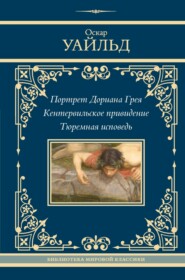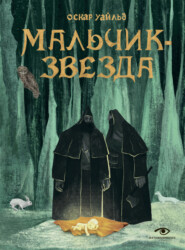По всем вопросам обращайтесь на: info@litportal.ru
(©) 2003-2025.
✖
Lord Arthur Savile's Crime; The Portrait of Mr. W.H., and Other Stories
Настройки чтения
Размер шрифта
Высота строк
Поля
‘I cannot explain it to you,’ I rejoined, ‘but I see now that there is really nothing to be said in favour of Cyril Graham’s interpretation. The Sonnets are addressed to Lord Pembroke. For heaven’s sake don’t waste your time in a foolish attempt to discover a young Elizabethan actor who never existed, and to make a phantom puppet the centre of the great cycle of Shakespeare’s Sonnets.’
‘I see that you don’t understand the theory,’ he replied.
‘My dear Erskine,’ I cried, ‘not understand it! Why, I feel as if I had invented it. Surely my letter shows you that I not merely went into the whole matter, but that I contributed proofs of every kind. The one flaw in the theory is that it presupposes the existence of the person whose existence is the subject of dispute. If we grant that there was in Shakespeare’s company a young actor of the name of Willie Hughes, it is not difficult to make him the object of the Sonnets. But as we know that there was no actor of this name in the company of the Globe Theatre, it is idle to pursue the investigation further.’
‘But that is exactly what we don’t know,’ said Erskine. ‘It is quite true that his name does not occur in the list given in the first folio; but, as Cyril pointed out, that is rather a proof in favour of the existence of Willie Hughes than against it, if we remember his treacherous desertion of Shakespeare for a rival dramatist.’
We argued the matter over for hours, but nothing that I could say could make Erskine surrender his faith in Cyril Graham’s interpretation. He told me that he intended to devote his life to proving the theory, and that he was determined to do justice to Cyril Graham’s memory. I entreated him, laughed at him, begged of him, but it was of no use. Finally we parted, not exactly in anger, but certainly with a shadow between us. He thought me shallow, I thought him foolish. When I called on him again his servant told me that he had gone to Germany.
Two years afterwards, as I was going into my club, the hall-porter handed me a letter with a foreign postmark. It was from Erskine, and written at the Hôtel d’Angleterre, Cannes. When I had read it I was filled with horror, though I did not quite believe that he would be so mad as to carry his resolve into execution. The gist of the letter was that he had tried in every way to verify the Willie Hughes theory, and had failed, and that as Cyril Graham had given his life for this theory, he himself had determined to give his own life also to the same cause. The concluding words of the letter were these: ‘I still believe in Willie Hughes; and by the time you receive this, I shall have died by my own hand for Willie Hughes’s sake: for his sake, and for the sake of Cyril Graham, whom I drove to his death by my shallow scepticism and ignorant lack of faith. The truth was once revealed to you, and you rejected it. It comes to you now stained with the blood of two lives, – do not turn away from it.’
It was a horrible moment. I felt sick with misery, and yet I could not believe it. To die for one’s theological beliefs is the worst use a man can make of his life, but to die for a literary theory! It seemed impossible.
I looked at the date. The letter was a week old. Some unfortunate chance had prevented my going to the club for several days, or I might have got it in time to save him. Perhaps it was not too late. I drove off to my rooms, packed up my things, and started by the night-mail from Charing Cross. The journey was intolerable. I thought I would never arrive. As soon as I did I drove to the Hôtel l’Angleterre. They told me that Erskine had been buried two days before in the English cemetery. There was something horribly grotesque about the whole tragedy. I said all kinds of wild things, and the people in the hall looked curiously at me.
Suddenly Lady Erskine, in deep mourning, passed across the vestibule. When she saw me she came up to me, murmured something about her poor son, and burst into tears. I led her into her sitting-room. An elderly gentleman was there waiting for her. It was the English doctor.
We talked a great deal about Erskine, but I said nothing about his motive for committing suicide. It was evident that he had not told his mother anything about the reason that had driven him to so fatal, so mad an act. Finally Lady Erskine rose and said, George left you something as a memento. It was a thing he prized very much. I will get it for you.
As soon as she had left the room I turned to the doctor and said, ‘What a dreadful shock it must have been to Lady Erskine! I wonder that she bears it as well as she does.’
‘Oh, she knew for months past that it was coming,’ he answered.
‘Knew it for months past!’ I cried. ‘But why didn’t she stop him? Why didn’t she have him watched? He must have been mad.’
The doctor stared at me. ‘I don’t know what you mean,’ he said.
‘Well,’ I cried, ‘if a mother knows that her son is going to commit suicide – ’
‘Suicide!’ he answered. ‘Poor Erskine did not commit suicide. He died of consumption. He came here to die. The moment I saw him I knew that there was no hope. One lung was almost gone, and the other was very much affected. Three days before he died he asked me was there any hope. I told him frankly that there was none, and that he had only a few days to live. He wrote some letters, and was quite resigned, retaining his senses to the last.’
At that moment Lady Erskine entered the room with the fatal picture of Willie Hughes in her hand. ‘When George was dying he begged me to give you this,’ she said. As I took it from her, her tears fell on my hand.
The picture hangs now in my library, where it is very much admired by my artistic friends. They have decided that it is not a Clouet, but an Oudry. I have never cared to tell them its true history. But sometimes, when I look at it, I think that there is really a great deal to be said for the Willie Hughes theory of Shakespeare’s Sonnets.
notes
1
Sonnet xx. 2.
2
Sonnet xxvi. 1.
3
Sonnet cxxvi. 9.
4
Sonnet cix. 14.
5
Sonnet i. 10.
6
Sonnet ii. 3.
7
Sonnet viii. 1.
8
Sonnet xxii. 6.
9
Sonnet xcv. 1.

















